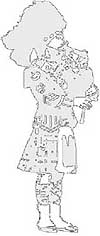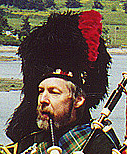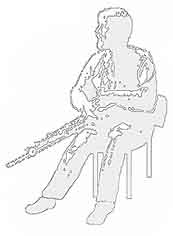 |
 |
 |
 |
All photos and artwork Copyright 2000-2008 Beth Ann Daye
All sound samples Copyright 2008 David C. Daye
 |
 |
 |
 |
|
|
The Scottish pipes are the familiar military/marching bagpipes best known around the world. They have a strong sound but not overpowering except in small rooms: they're about as loud as 1-2 trumpets. They project well over distances outdoors or in crowded dance halls and auditoriums, and are ideal for many types of ceremonies both joyful and somber, as well as for entertaining at lively parties. They're almost always played standing, and while the piper often plays standing still at attention, pipers often move slowly about or formally march. They're ideal for parades and for leading people in and out of events or portions of ceremonies. I maintain my Scottish pipes at concert B-flat pitch for occasional partnering with church organs or ensembles. The Scottish pipes are virtually always played while wearing some variation of traditional military or civilian dress based on the kilt.
The Irish pipes are quite rare, more elaborate, with a greater musical range, and much quieter at a strength of 1-2 fiddles, although they are quite sufficient for modest sized gatherings especially if the company present are quiet as in church or funeral settings. They can only be played sitting down, and play at concert pitch in the common folk music keys of D, E, G and A in several modes. There is no traditional costume for the Irish pipes, so the piper typically dresses like the rest of the company present, from jeans or shorts for festivals & folk bands, to coat & tie for more formal events such as weddings, funerals etc.
Because both bagpipes have a very rich and dominating sound, they are not normally used to provide extended background music for a static gathering the way for example harps or guitars are often used. They're ideal for such playing if the audience is passing by or changing, for example outside a wedding ceremony as guests arrive, or outside a festival or storefront to attract patrons. For entertaining, short sets of 2-3-minute pieces totalling 10-15 minutes at a time are good for most general audiences. A common use is to play briefly during breaks in recorded music or a live dance band.
For parties it's common to engage a piper for perhaps an hour, during which 2-3 short sets would be presented. But it's also common to request just one single set for example at a high point of an event, and for ceremonial events frequently just one tune at one specified point in the proceedings is needed.
In playing for your event or ceremony, I deliver the most professional performance possible and make every effort to be flexible within the moment in both timing and music selections, to adapt to your changing schedule and needs. When not actually playing I typically retire out of sight, and I will arrange the costume choice with you in advance, all to make sure I fit into your event as you you want me, not stealing the limelight. If you want a big splash, I'm ready to make it. If I'm to be a surprise for some of your guests, I'll arrive in street clothes and keep the secret till the moment you want me to play.
|
|
Step Dances |
The "Formal Evening" wear is what I most often suggest with the Scottish pipes for weddings and funerals, so that I'm not as visually dramatic and potentially distracting as in the Full Military dress. Some clients however prefer the more dramatic costume and request it. Full Military is often requested for military or other service-related funerals. Again there is no traditional costume for the uilleann pipes, so I typically wear casual street clothes for festival or party appearances, and a coat & tie for weddings and funerals.
Music selection depends on your preferences plus the nature of the event and the particular moment I'm asked to play.
Wedding piping might be as little as one special solo piece at a particular moment of the ceremony or reception, or it might involve a little or much more. Typically clients request 2-3 appearanced during the events. Piping may be requested for a special piece during the ceremony or reception, and/or for any or all of the following: piping outside for 15-20 minutes as guests arrive; piping-in the groom, bridesmaids and/or the bride; piping-out the couple at the end of the ceremony; piping outside as guests wait for the couple to emerge after photographs; piping-in the couple to the reception; playing one or two solo medlies as brief standup entertainment at the reception. I can manage as little or as much as you like, including costume change for example from the Evening Wear at a wedding ceremony to either the casual summer shirt or perhaps the dramatic Full Military for an appearance at the reception. I have a more limited range with the uilleann pipes.
I have plenty of traditional repertoire I would choose that's appropriate to the upbeat mood of the occasion, and will try to play your specific tune requests if they are bagpipingly possible and I know or can learn them in time.
Funeral piping is most often a small number of appearances, often simply a funeral lament at the end of the service and/or perhaps at graveside. "Amazing Grace," which was almost never heard on pipes before the 1971 pop hit by the Scots Dragoons Guards pipers, is my most requrest tune nowdays. However it is also the tune most requested that I do not play, by either those who prefer a traditional laments or those for whom it's become too emotional perhaps because of its frequent use after the 9/11 tragedy. If there are no specific requests I have plenty of appropriate material to volunteer.
I started the Scottish pipe in 1966 at age 15. I competed in the 1970's and 80's in traditional solo contests, winning in march and dance music up to the top amateur level (Grade I), played over 20 years for the Columbus Scottish Highalnd Dancers, led Columbus' Capital City Pipes & Drums band as Pipe-Major for 7 years in the 70's-80's, and competed as a member of Cleveland's North Coast Pipe Band the year of their founding in 1986. In 1993 I was voted Best Street Musician by Columbus Alive magazine and appeared as guest soloist with the Columbus Symphony playing the "Orkney Wedding With Sunrise."
I bought my first Irish uilleann pipes in 1984. I helped found Columbus' "Innisheer" Celtic trad band and played Highland and uilleann pipes and some tin whistle with them for about 10 years.
Over the years I've played hundreds of weddings and funerals for people of all faiths and no faith, and many for service people although I've not served as military or police/fire myself. I've piped-in "mony" a Haggis for Burns Suppers, played for Irish ceilis and step dancers, appeared in numerous Brigadoons, done basically everything that can be done traditionally with the Highland pipes and much of what's possible with the uilleanns.
The Irish uilleann pipes as an instrument in the late 20th century were in a terrible state due to being so extraordinarily rare that none of the few families who'd developed them over 3 centuries had left any trained apprentices still making instruments by that time. The frustrations of trying to keep needlessly balky instruments stage-ready took me out of playing them in public and into experimentation made possible in the piping backwoods of Ohio by the new Internet and web. This led to my inventing a new construction that let experimenters involve themselves with performance quality studies while opening the availability to lower income musicians and students. My design was published free on the new World Wide Web which allowed collaborators and home builders worldwide to make their own stageworthy uilleann pipes for the first time in history without highly specialized tools and materials.
In 1998 after losing my university computer tech job, I became a fulltime pipemaker, and have been ever since.
Commercial Page for Pipemaker
| 2 Stately Marches |
"The Badge of Scotland" traditional 4/4 common time march,
easy for other participants to follow for ceremonial processionals. "My Home" traditional 6/8 time march. |
| Strict Contest Highland Dances |
"Ghillie Calum" for the Highland Sword Dance into "My Love is But a Lassie Yet" for Hornpipe (this combination is not played for actual dancing). Live unprocessed outdoor recording. |
| Outdoor March-In |
1st half of "Rab's Wedding" by John Kerr, recorded live near Strawberry Point marching up forest path towards recording site. |
| Traditional Jig & Reel |
"Paddy's Leather Breeches" traditional jig, "The Rejected Suitor" traditional reel military timing style, live outdoor recording. |
| CD Recording |
"Farewell to the Creeks" traditional march with John Sherman Celtic guitar accompaniment, title track of John's album |
| Live Folk Band |
"The Jig of Slurs" by G.S. MacLennan, recorded live from the mixing board of Innisheer folk band, Columbus Ohio 1990, duet with Sandy Jones fiddle at Stache & Little Brother's bar north of OSU campus on High Street. |
| Amazing Grace |
Slow version, the world pop single hit introduced 1971 by the Royal Scots Dragoons Guards and taken from Judy Collins' slow gospel version on album Whales and Nightengales. The slow pace inspired its use at funerals. Quick version from the more traditional joyous hymnal version. |
| Live Folk Band |
"The Banshee" recorded live from the mixing board of Innisheer folk band, Columbus Ohio 1990, duet with wife Beth Ann playing bodhran (Irish hand drum) at Stache & Little Brother's bar north of OSU campus on High Street. |
| CD Christmas Carol |
"Silent Night" phrase ending for "West Belfast Christmas" song by Dave Hawkins, Columbus Ohio. |
Bottom of David Daye Piper page. .